
composio
Composio equips your AI agents & LLMs with 100+ high-quality integrations via function calling
Stars: 26541
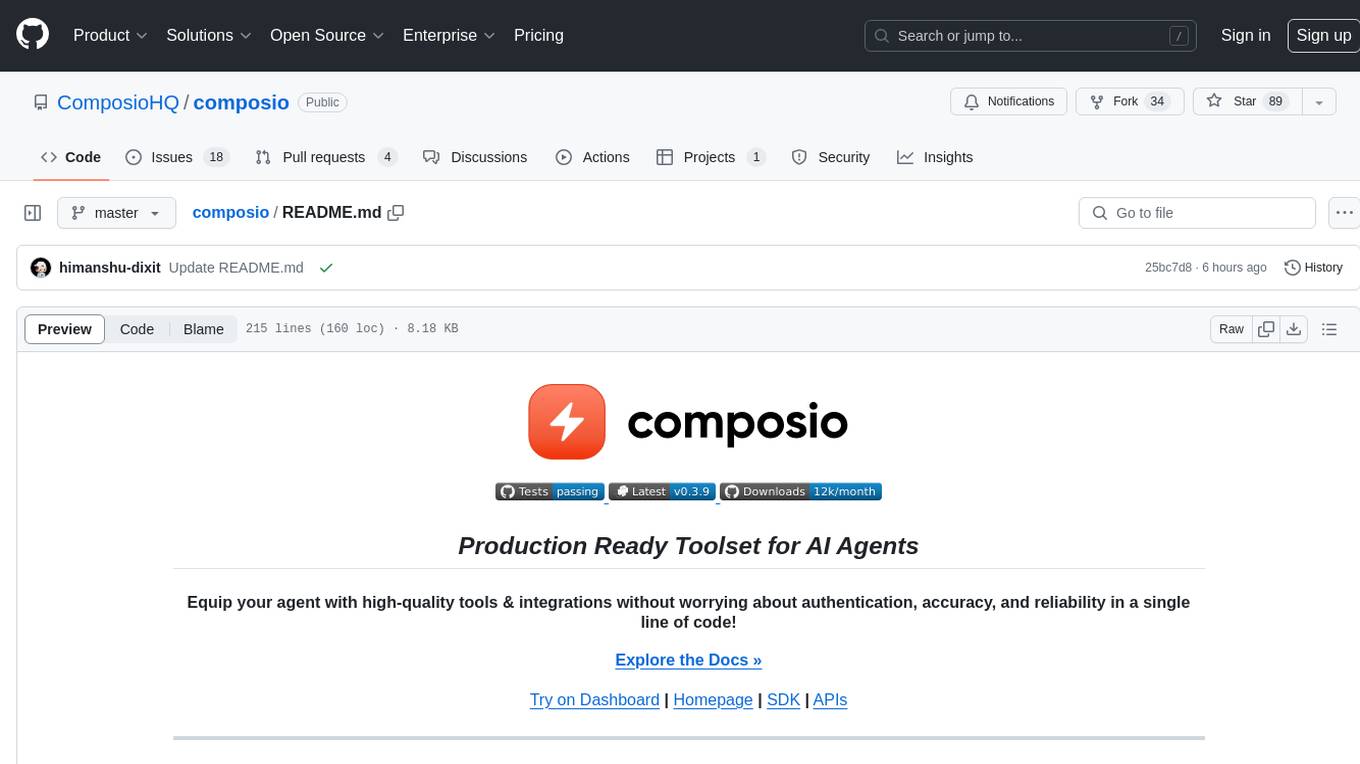
Composio is a production-ready toolset for AI agents that enables users to integrate AI agents with various agentic tools effortlessly. It provides support for over 100 tools across different categories, including popular softwares like GitHub, Notion, Linear, Gmail, Slack, and more. Composio ensures managed authorization with support for six different authentication protocols, offering better agentic accuracy and ease of use. Users can easily extend Composio with additional tools, frameworks, and authorization protocols. The toolset is designed to be embeddable and pluggable, allowing for seamless integration and consistent user experience.
README:
This repository contains the official Software Development Kits (SDKs) for Composio, providing seamless integration capabilities for Python and Typescript Agentic Frameworks and Libraries.
# Using npm
npm install @composio/core
# Using yarn
yarn add @composio/core
# Using pnpm
pnpm add @composio/coreimport { Composio } from '@composio/core';
// Initialize the SDK
const composio = new Composio({
// apiKey: 'your-api-key',
});npm install @composio/openai-agents @openai/agentsimport { Composio } from '@composio/core';
import { OpenAIAgentsProvider } from '@composio/openai-agents';
import { Agent, run } from '@openai/agents';
const composio = new Composio({
provider: new OpenAIAgentsProvider(),
});
const userId = '[email protected]';
const tools = await composio.tools.get(userId, {
toolkits: ['HACKERNEWS'],
});
const agent = new Agent({
name: 'Hackernews assistant',
tools: tools,
});
const result = await run(agent, 'What is the latest hackernews post about?');
console.log(JSON.stringify(result.finalOutput, null, 2));
// will return the response from the agent with data from HACKERNEWS API.# Using pip
pip install composio
# Using poetry
poetry add composiofrom composio import Composio
composio = Composio(
# api_key="your-api-key",
)pip install composio_openai_agents openai-agentsimport asyncio
from agents import Agent, Runner
from composio import Composio
from composio_openai_agents import OpenAIAgentsProvider
# Initialize Composio client with OpenAI Agents Provider
composio = Composio(provider=OpenAIAgentsProvider())
user_id = "[email protected]"
tools = composio.tools.get(user_id=user_id, toolkits=["HACKERNEWS"])
# Create an agent with the tools
agent = Agent(
name="Hackernews Agent",
instructions="You are a helpful assistant.",
tools=tools,
)
# Run the agent
async def main():
result = await Runner.run(
starting_agent=agent,
input="What's the latest Hackernews post about?",
)
print(result.final_output)
asyncio.run(main())
# will return the response from the agent with data from HACKERNEWS API.For more detailed usage instructions and examples, please refer to each SDK's specific documentation.
To update the OpenAPI specifications used for generating SDK documentation:
# Pull the latest API specifications from the backend
pnpm api:pullThis command pulls the OpenAPI specification from https://backend.composio.dev/api/v3/openapi.json (defined in fern/scripts/pull-openapi-spec.sh) and updates the local API documentation files.
This is pulled automatically with build step.
The TypeScript SDK provides a modern, type-safe way to interact with Composio's services. It's designed for both Node.js and browser environments, offering full TypeScript support with comprehensive type definitions.
For detailed information about the TypeScript SDK, please refer to the TypeScript SDK Documentation.
The Python SDK offers a Pythonic interface to Composio's services, making it easy to integrate Composio into your Python applications. It supports Python 3.10+ and follows modern Python development practices.
For detailed information about the Python SDK, please refer to the Python SDK Documentation.
The following table shows which AI frameworks and platforms are supported in each SDK:
| Provider | TypeScript | Python |
|---|---|---|
| OpenAI | ✅ | ✅ |
| OpenAI Agents | ✅ | ✅ |
| Anthropic | ✅ | ✅ |
| LangChain | ✅ | ✅ |
| LangGraph | ✅* | ✅ |
| LlamaIndex | ✅ | ✅ |
| Vercel AI SDK | ✅ | ❌ |
| Google Gemini | ✅ | ✅ |
| Google ADK | ❌ | ✅ |
| Mastra | ✅ | ❌ |
| Cloudflare Workers AI | ✅ | ❌ |
| CrewAI | ❌ | ✅ |
| AutoGen | ❌ | ✅ |
* LangGraph in TypeScript is supported via the @composio/langchain package.
Don't see your provider? Learn how to build a custom provider to integrate with any AI framework.
| Package | Version |
|---|---|
| TypeScript | |
| @composio/core |  |
| Python | |
| composio |  |
| Package | Version |
|---|---|
| @composio/json-schema-to-zod |  |
| @composio/ts-builders |  |
if you are looking for the older sdk, you can find them here
Rube is a Model Context Protocol (MCP) server built with Composio. It connects your AI tools to 500+ apps like Gmail, Slack, GitHub, and Notion. Simply install it in your AI client, authenticate once with your apps, and start asking your AI to perform real actions like "Send an email" or "Create a task."
It integrates with major AI clients like Cursor, Claude Desktop, VS Code, Claude Code and any custom MCP‑compatible client. You can switch between these clients and your integrations follow you.
We welcome contributions to both SDKs! Please read our contribution guidelines before submitting pull requests.
This project is licensed under the MIT License - see the LICENSE file for details.
If you encounter any issues or have questions about the SDKs:
- Open an issue in this repository
- Contact our support team
- Check our documentation
For Tasks:
Click tags to check more tools for each tasksFor Jobs:
Alternative AI tools for composio
Similar Open Source Tools

composio
Composio is a production-ready toolset for AI agents that enables users to integrate AI agents with various agentic tools effortlessly. It provides support for over 100 tools across different categories, including popular softwares like GitHub, Notion, Linear, Gmail, Slack, and more. Composio ensures managed authorization with support for six different authentication protocols, offering better agentic accuracy and ease of use. Users can easily extend Composio with additional tools, frameworks, and authorization protocols. The toolset is designed to be embeddable and pluggable, allowing for seamless integration and consistent user experience.
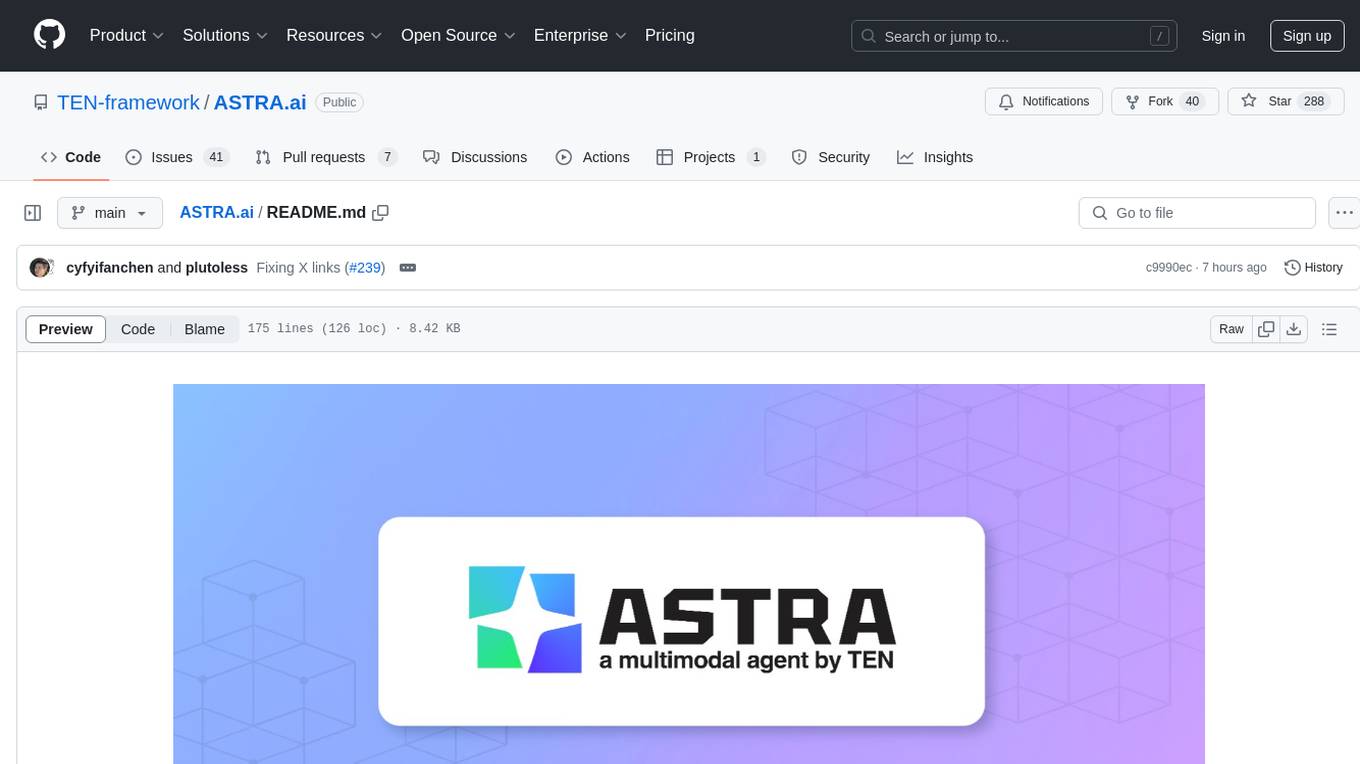
ASTRA.ai
Astra.ai is a multimodal agent powered by TEN, showcasing its capabilities in speech, vision, and reasoning through RAG from local documentation. It provides a platform for developing AI agents with features like RTC transportation, extension store, workflow builder, and local deployment. Users can build and test agents locally using Docker and Node.js, with prerequisites including Agora App ID, Azure's speech-to-text and text-to-speech API keys, and OpenAI API key. The platform offers advanced customization options through config files and API keys setup, enabling users to create and deploy their AI agents for various tasks.
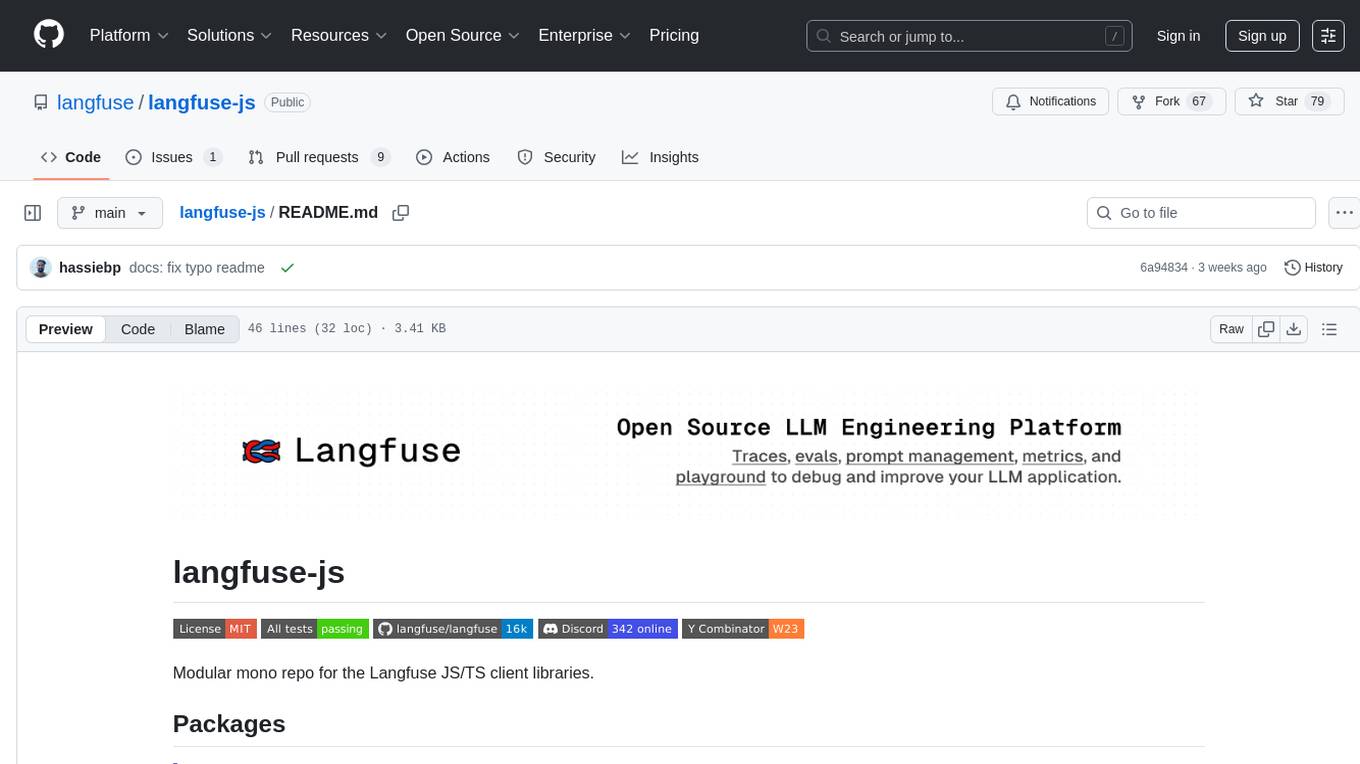
langfuse-js
langfuse-js is a modular mono repo for the Langfuse JS/TS client libraries. It includes packages for Langfuse API client, tracing, OpenTelemetry export helpers, OpenAI integration, and LangChain integration. The SDK is currently in version 4 and offers universal JavaScript environments support as well as Node.js 20+. The repository provides documentation, reference materials, and development instructions for managing the monorepo with pnpm. It is licensed under MIT.
helicone
Helicone is an open-source observability platform designed for Language Learning Models (LLMs). It logs requests to OpenAI in a user-friendly UI, offers caching, rate limits, and retries, tracks costs and latencies, provides a playground for iterating on prompts and chat conversations, supports collaboration, and will soon have APIs for feedback and evaluation. The platform is deployed on Cloudflare and consists of services like Web (NextJs), Worker (Cloudflare Workers), Jawn (Express), Supabase, and ClickHouse. Users can interact with Helicone locally by setting up the required services and environment variables. The platform encourages contributions and provides resources for learning, documentation, and integrations.
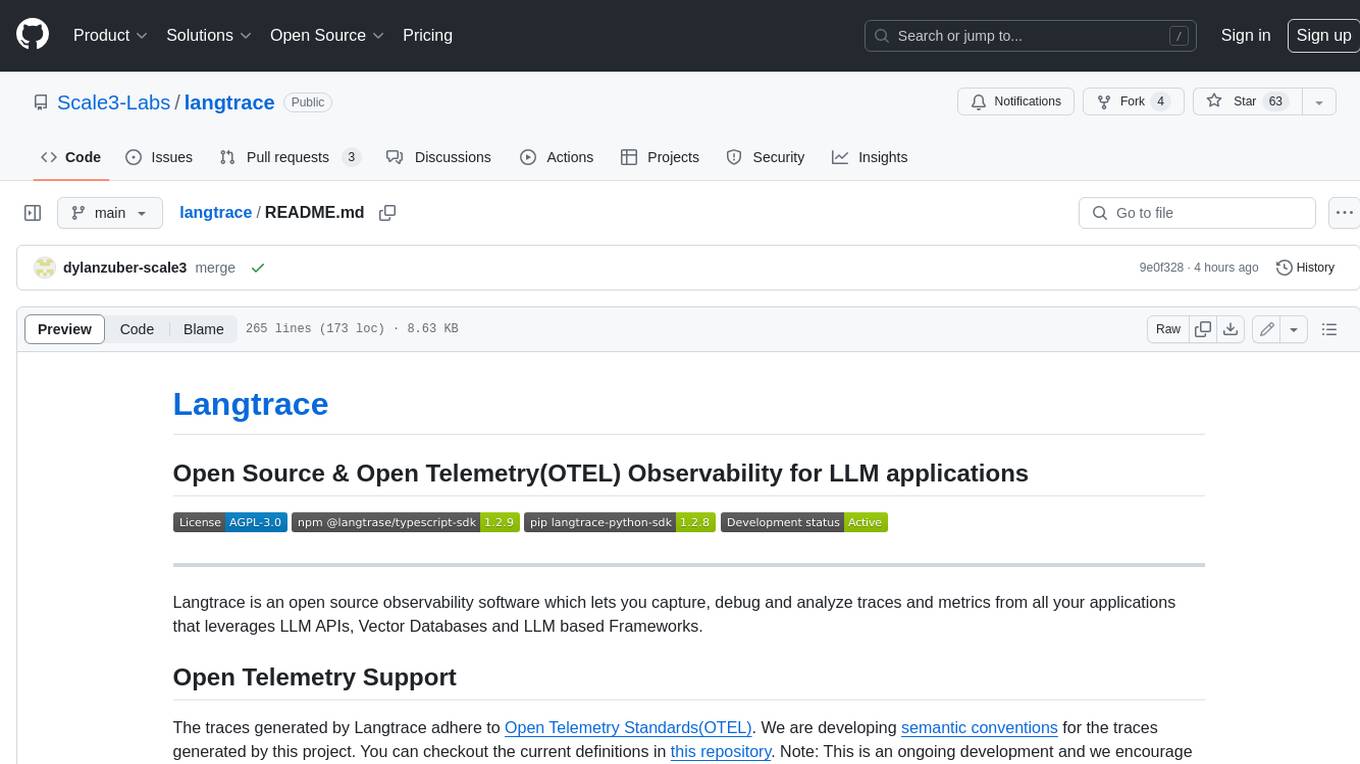
langtrace
Langtrace is an open source observability software that lets you capture, debug, and analyze traces and metrics from all your applications that leverage LLM APIs, Vector Databases, and LLM-based Frameworks. It supports Open Telemetry Standards (OTEL), and the traces generated adhere to these standards. Langtrace offers both a managed SaaS version (Langtrace Cloud) and a self-hosted option. The SDKs for both Typescript/Javascript and Python are available, making it easy to integrate Langtrace into your applications. Langtrace automatically captures traces from various vendors, including OpenAI, Anthropic, Azure OpenAI, Langchain, LlamaIndex, Pinecone, and ChromaDB.
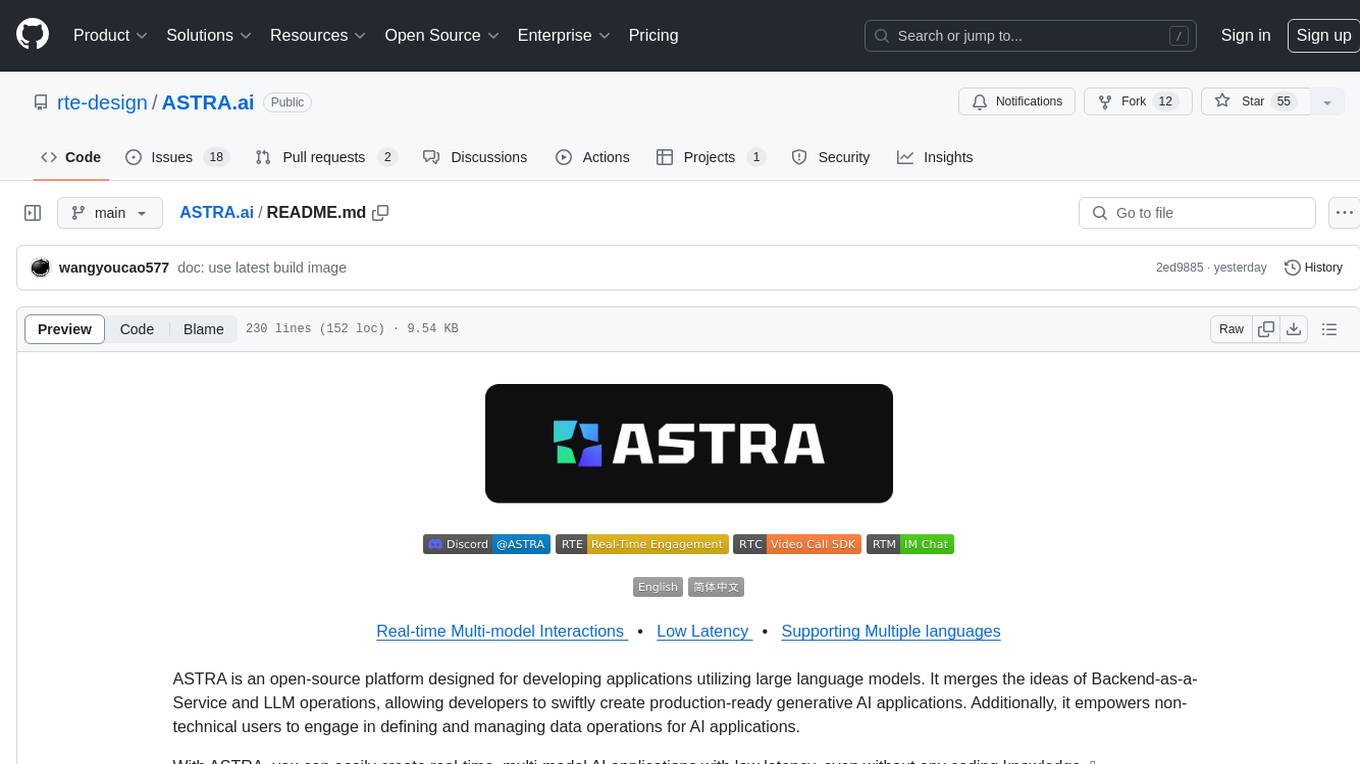
ASTRA.ai
ASTRA is an open-source platform designed for developing applications utilizing large language models. It merges the ideas of Backend-as-a-Service and LLM operations, allowing developers to swiftly create production-ready generative AI applications. Additionally, it empowers non-technical users to engage in defining and managing data operations for AI applications. With ASTRA, you can easily create real-time, multi-modal AI applications with low latency, even without any coding knowledge.
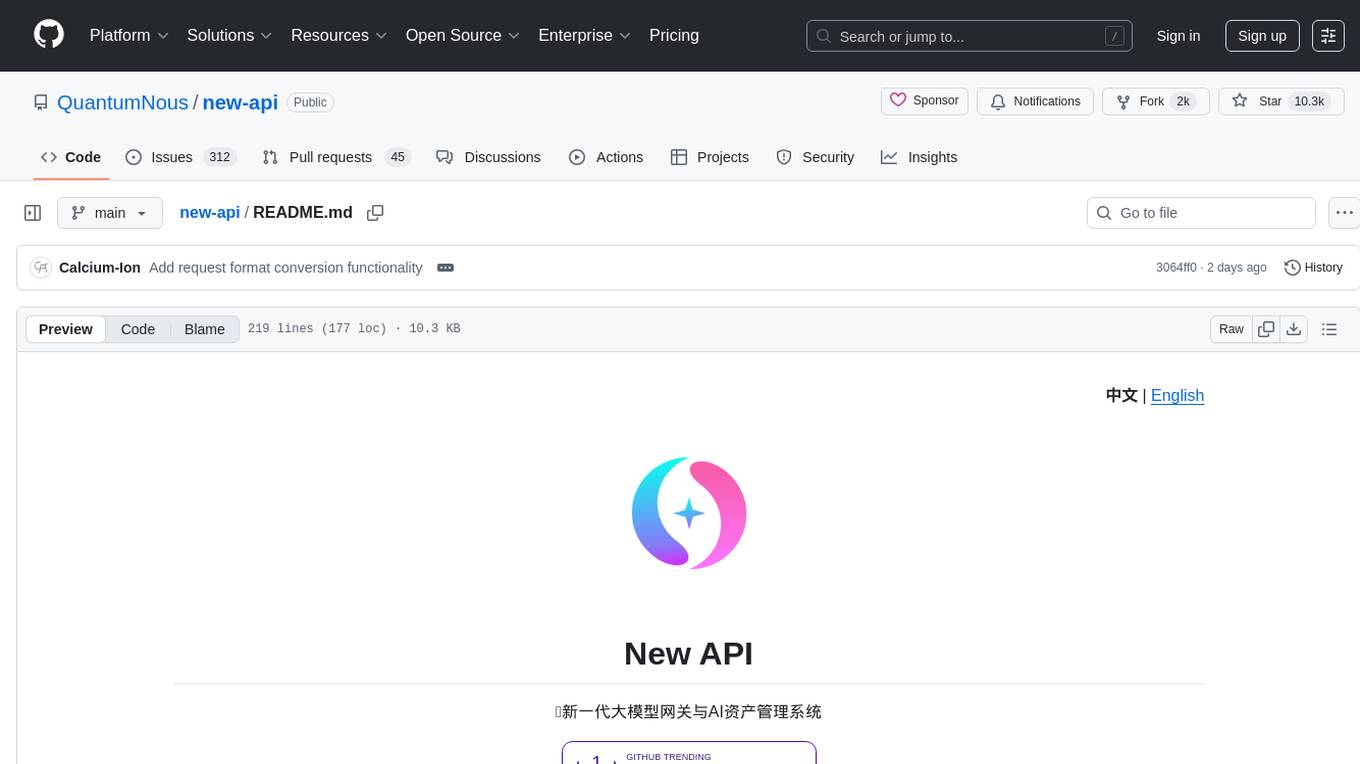
new-api
New API is a next-generation large model gateway and AI asset management system that provides a wide range of features, including a new UI interface, multi-language support, online recharge function, key query for usage quota, compatibility with the original One API database, model charging by usage count, channel weighted randomization, data dashboard, token grouping and model restrictions, support for various authorization login methods, support for Rerank models, OpenAI Realtime API, Claude Messages format, reasoning effort setting, content reasoning, user-specific model rate limiting, request format conversion, cache billing support, and various model support such as gpts, Midjourney-Proxy, Suno API, custom channels, Rerank models, Claude Messages format, Dify, and more.
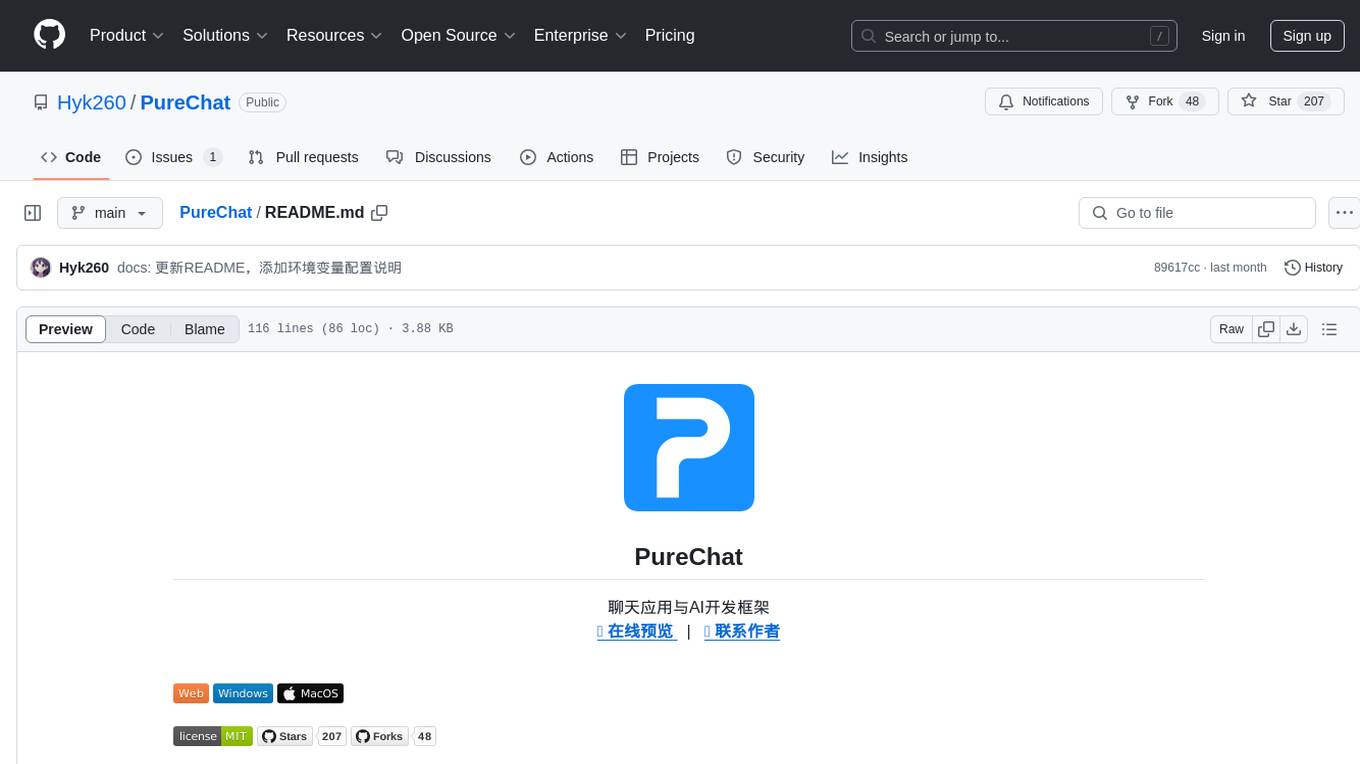
PureChat
PureChat is a chat application integrated with ChatGPT, featuring efficient application building with Vite5, screenshot generation and copy support for chat records, IM instant messaging SDK for sessions, automatic light and dark mode switching based on system theme, Markdown rendering, code highlighting, and link recognition support, seamless social experience with GitHub quick login, integration of large language models like ChatGPT Ollama for streaming output, preset prompts, and context, Electron desktop app versions for macOS and Windows, ongoing development of more features. Environment setup requires Node.js 18.20+. Clone code with 'git clone https://github.com/Hyk260/PureChat.git', install dependencies with 'pnpm install', start project with 'pnpm dev', and build with 'pnpm build'.
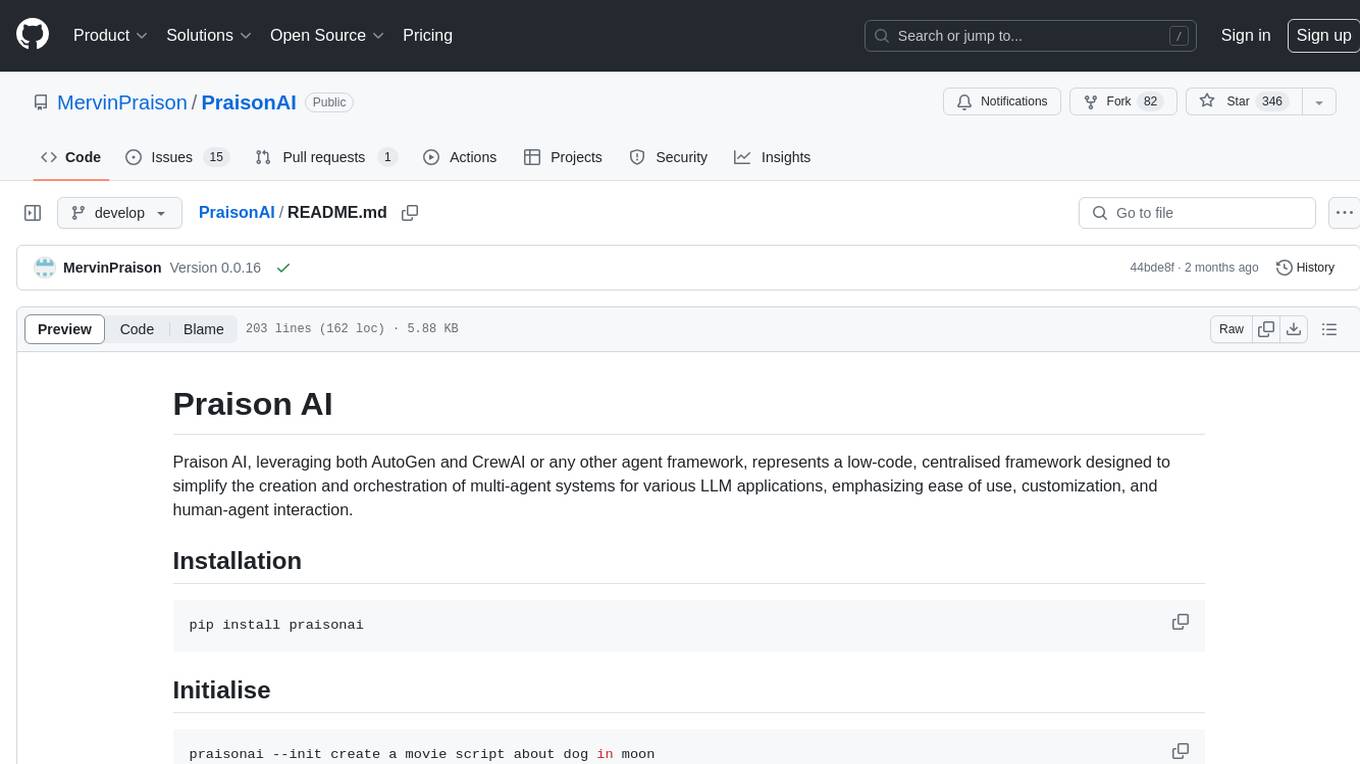
PraisonAI
Praison AI is a low-code, centralised framework that simplifies the creation and orchestration of multi-agent systems for various LLM applications. It emphasizes ease of use, customization, and human-agent interaction. The tool leverages AutoGen and CrewAI frameworks to facilitate the development of AI-generated scripts and movie concepts. Users can easily create, run, test, and deploy agents for scriptwriting and movie concept development. Praison AI also provides options for full automatic mode and integration with OpenAI models for enhanced AI capabilities.
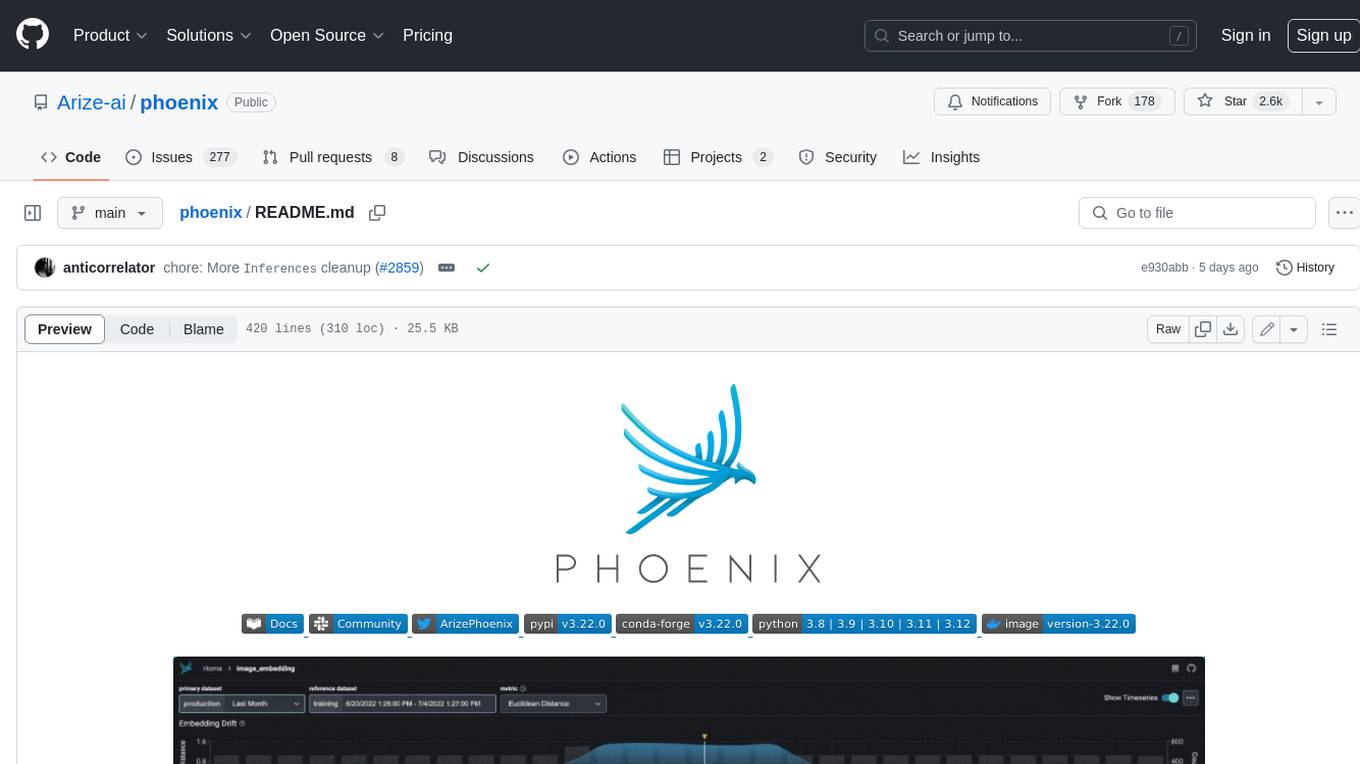
phoenix
Phoenix is a tool that provides MLOps and LLMOps insights at lightning speed with zero-config observability. It offers a notebook-first experience for monitoring models and LLM Applications by providing LLM Traces, LLM Evals, Embedding Analysis, RAG Analysis, and Structured Data Analysis. Users can trace through the execution of LLM Applications, evaluate generative models, explore embedding point-clouds, visualize generative application's search and retrieval process, and statistically analyze structured data. Phoenix is designed to help users troubleshoot problems related to retrieval, tool execution, relevance, toxicity, drift, and performance degradation.
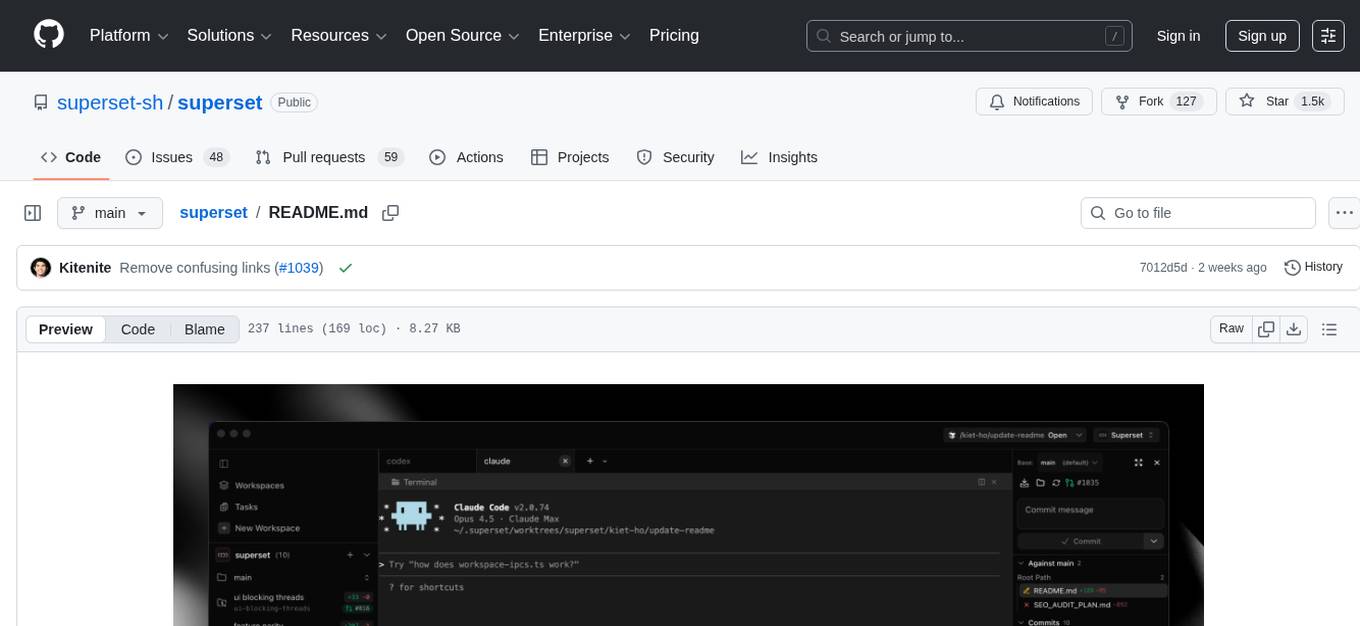
superset
Superset is a turbocharged terminal that allows users to run multiple CLI coding agents simultaneously, isolate tasks in separate worktrees, monitor agent status, review changes quickly, and enhance development workflow. It supports any CLI-based coding agent and offers features like parallel execution, worktree isolation, agent monitoring, built-in diff viewer, workspace presets, universal compatibility, quick context switching, and IDE integration. Users can customize keyboard shortcuts, configure workspace setup, and teardown, and contribute to the project. The tech stack includes Electron, React, TailwindCSS, Bun, Turborepo, Vite, Biome, Drizzle ORM, Neon, and tRPC. The community provides support through Discord, Twitter, GitHub Issues, and GitHub Discussions.
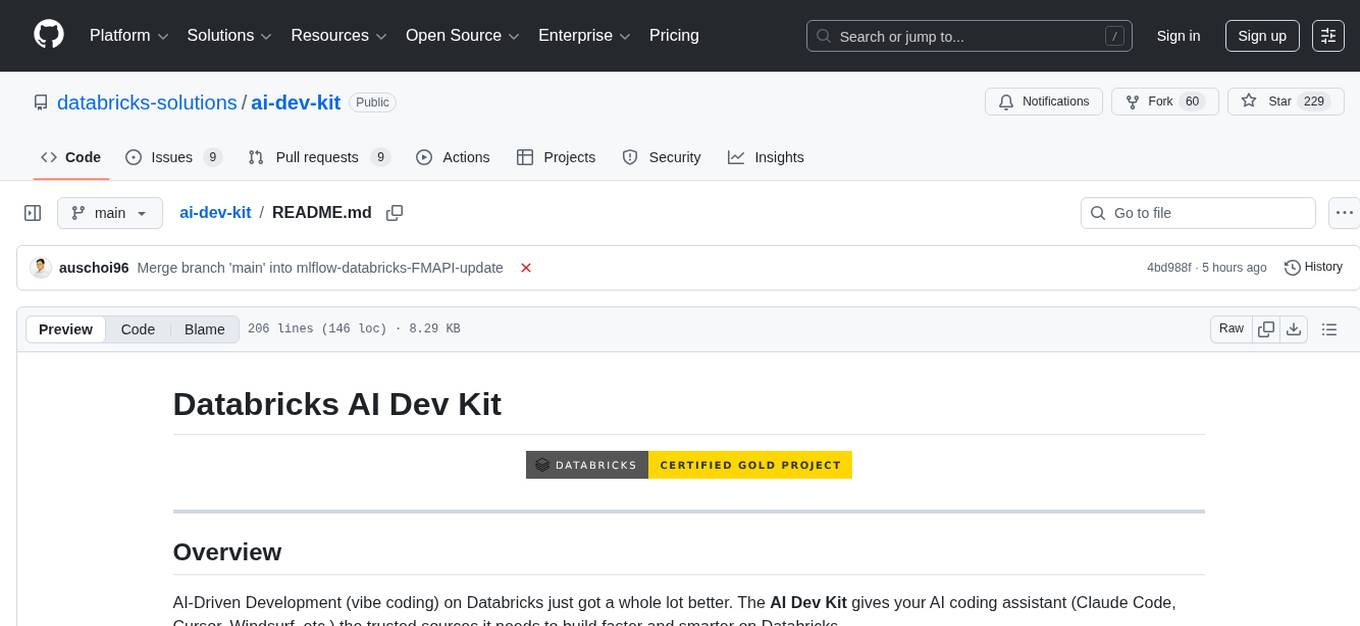
ai-dev-kit
The AI Dev Kit is a comprehensive toolkit designed to enhance AI-driven development on Databricks. It provides trusted sources for AI coding assistants like Claude Code and Cursor to build faster and smarter on Databricks. The kit includes features such as Spark Declarative Pipelines, Databricks Jobs, AI/BI Dashboards, Unity Catalog, Genie Spaces, Knowledge Assistants, MLflow Experiments, Model Serving, Databricks Apps, and more. Users can choose from different adventures like installing the kit, using the visual builder app, teaching AI assistants Databricks patterns, executing Databricks actions, or building custom integrations with the core library. The kit also includes components like databricks-tools-core, databricks-mcp-server, databricks-skills, databricks-builder-app, and ai-dev-project.
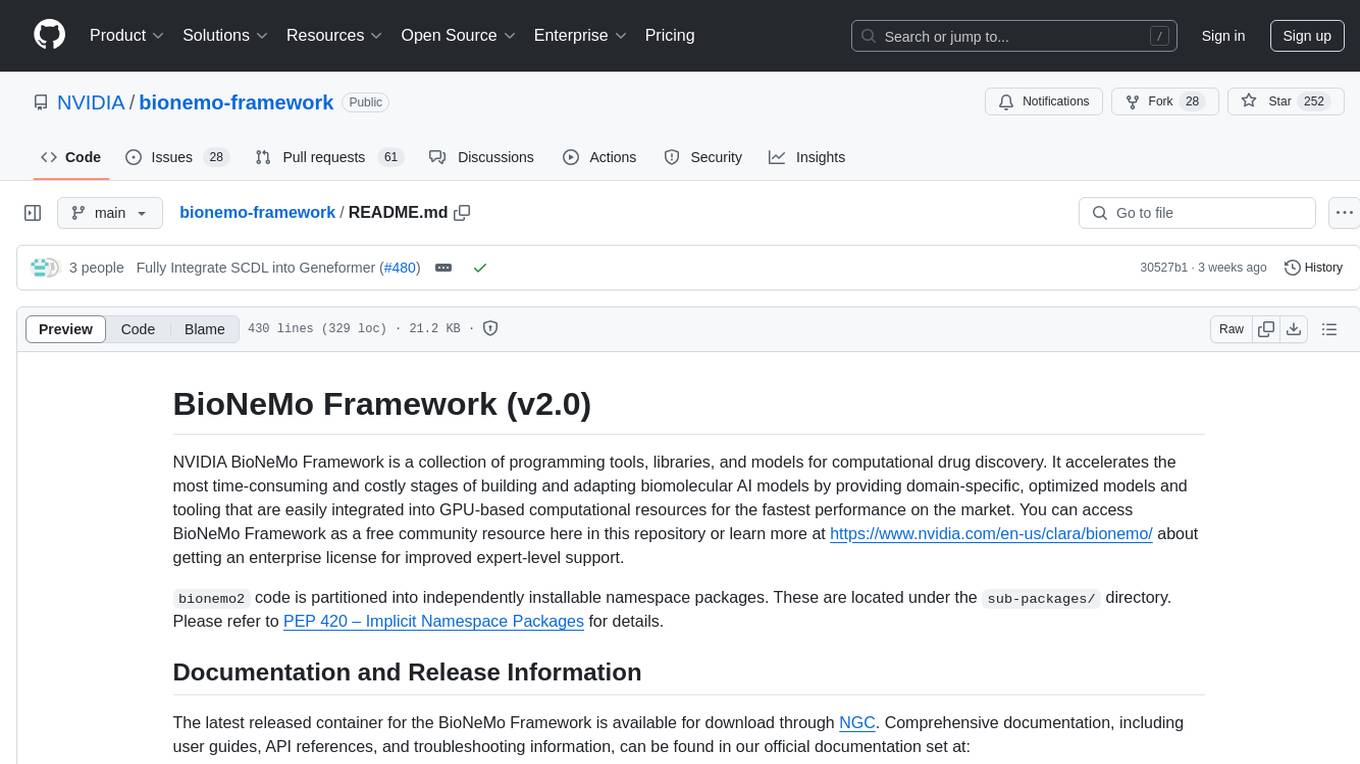
bionemo-framework
NVIDIA BioNeMo Framework is a collection of programming tools, libraries, and models for computational drug discovery. It accelerates building and adapting biomolecular AI models by providing domain-specific, optimized models and tooling for GPU-based computational resources. The framework offers comprehensive documentation and support for both community and enterprise users.
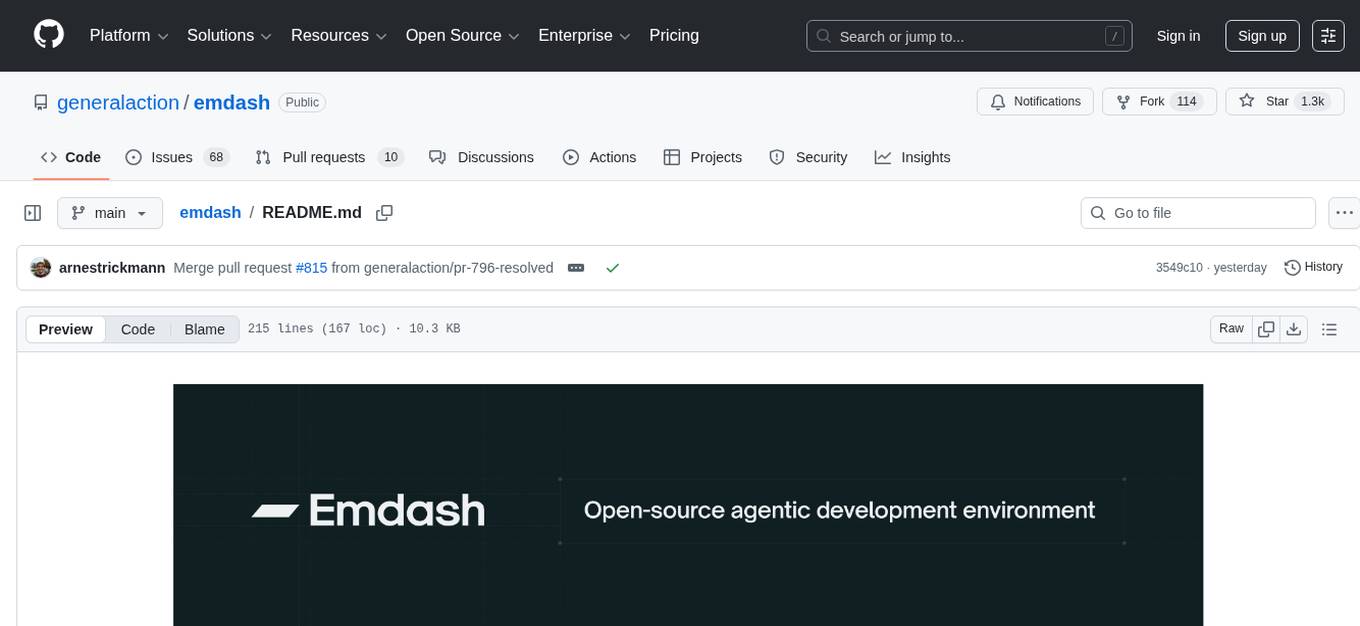
emdash
Emdash is a tool that allows users to run multiple coding agents in parallel, enabling the development and testing of multiple features simultaneously. It supports various CLI agents and runs each agent in its own Git worktree for clean changes. Users can connect to remote servers via SSH/SFTP to work with remote codebases, supporting SSH agent and key authentication. Emdash facilitates handing off Linear, GitHub, or Jira tickets to an agent and reviewing diffs side-by-side.
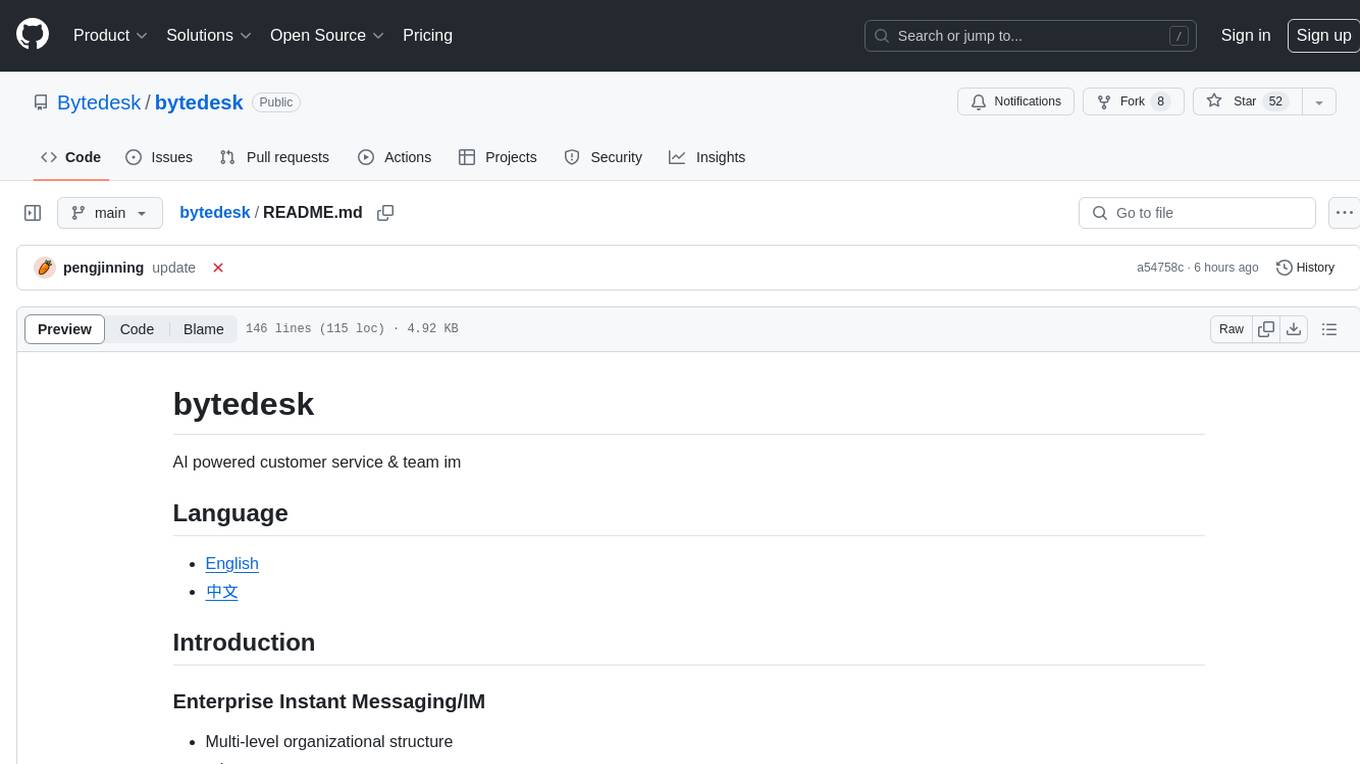
bytedesk
Bytedesk is an AI-powered customer service and team instant messaging tool that offers features like enterprise instant messaging, online customer service, large model AI assistant, and local area network file transfer. It supports multi-level organizational structure, role management, permission management, chat record management, seating workbench, work order system, seat management, data dashboard, manual knowledge base, skill group management, real-time monitoring, announcements, sensitive words, CRM, report function, and integrated customer service workbench services. The tool is designed for team use with easy configuration throughout the company, and it allows file transfer across platforms using WiFi/hotspots without the need for internet connection.
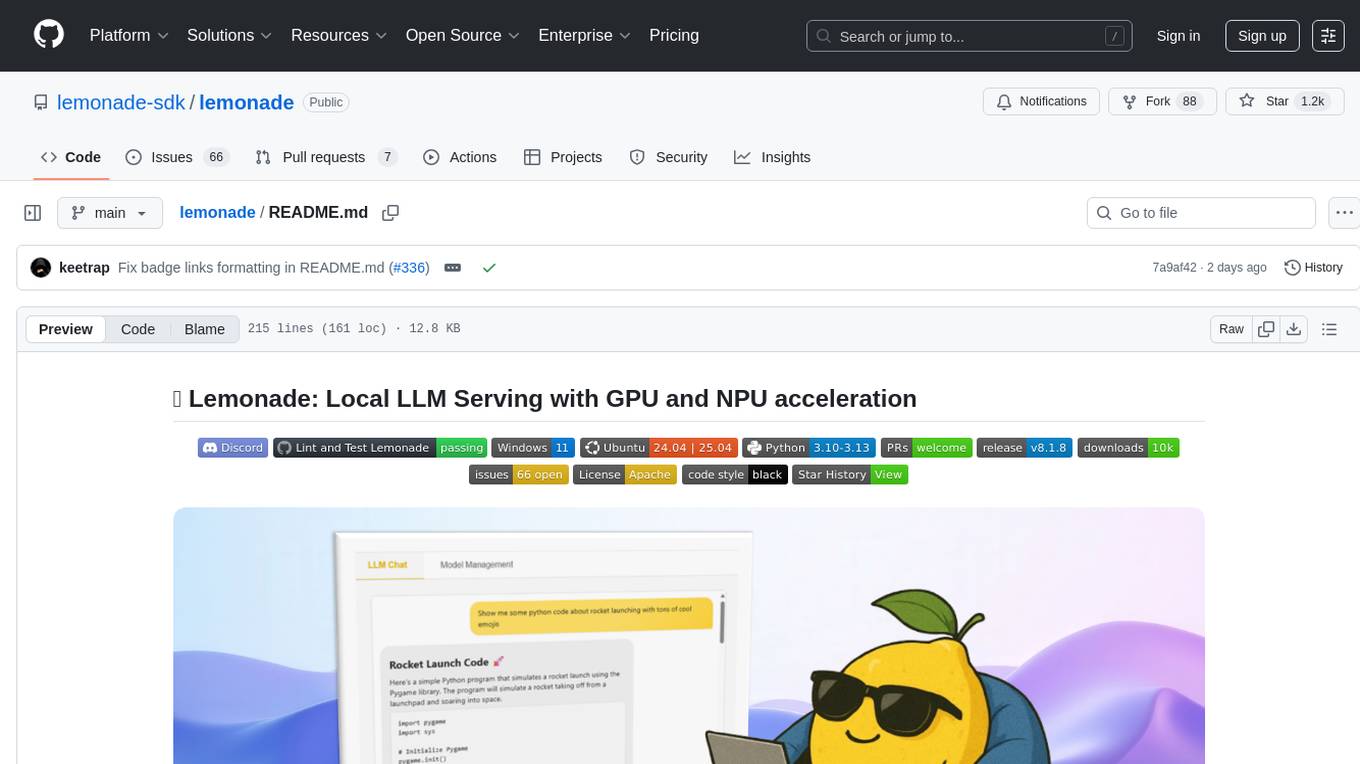
lemonade
Lemonade is a tool that helps users run local Large Language Models (LLMs) with high performance by configuring state-of-the-art inference engines for their Neural Processing Units (NPUs) and Graphics Processing Units (GPUs). It is used by startups, research teams, and large companies to run LLMs efficiently. Lemonade provides a high-level Python API for direct integration of LLMs into Python applications and a CLI for mixing and matching LLMs with various features like prompting templates, accuracy testing, performance benchmarking, and memory profiling. The tool supports both GGUF and ONNX models and allows importing custom models from Hugging Face using the Model Manager. Lemonade is designed to be easy to use and switch between different configurations at runtime, making it a versatile tool for running LLMs locally.
For similar tasks

composio
Composio is a production-ready toolset for AI agents that enables users to integrate AI agents with various agentic tools effortlessly. It provides support for over 100 tools across different categories, including popular softwares like GitHub, Notion, Linear, Gmail, Slack, and more. Composio ensures managed authorization with support for six different authentication protocols, offering better agentic accuracy and ease of use. Users can easily extend Composio with additional tools, frameworks, and authorization protocols. The toolset is designed to be embeddable and pluggable, allowing for seamless integration and consistent user experience.
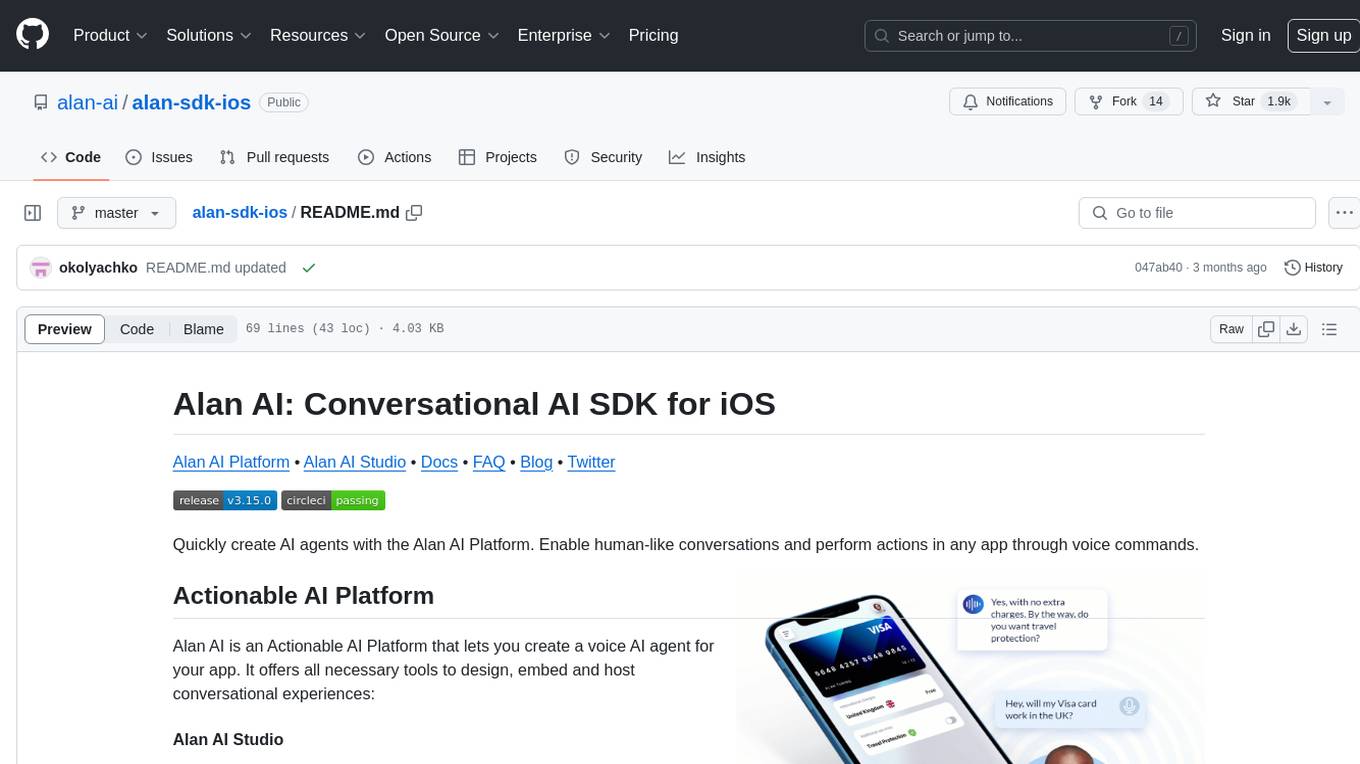
alan-sdk-ios
Alan AI SDK for iOS is a powerful tool that allows developers to quickly create AI agents for their iOS apps. With Alan AI Platform, users can easily design, embed, and host conversational experiences in their applications. The platform offers a web-based IDE called Alan AI Studio for creating dialog scenarios, lightweight SDKs for embedding AI agents, and a backend powered by top-notch speech recognition and natural language understanding technologies. Alan AI enables human-like conversations and actions through voice commands, with features like on-the-fly updates, dialog flow testing, and analytics.
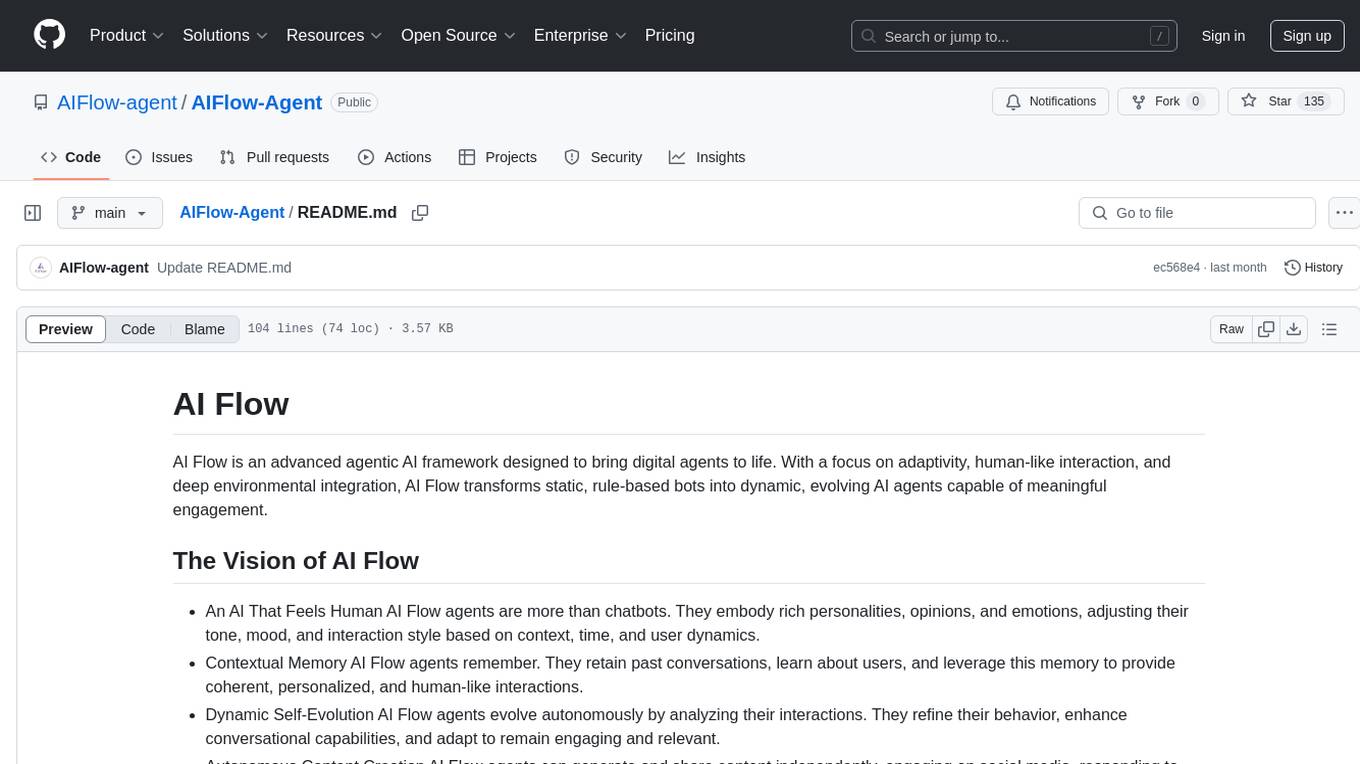
AIFlow-Agent
AI Flow is an advanced agentic AI framework that transforms static, rule-based bots into dynamic AI agents capable of meaningful engagement. It focuses on adaptivity, human-like interaction, and deep environmental integration. AI Flow agents embody rich personalities, opinions, and emotions, remember past conversations, evolve autonomously, create content independently, collaborate with other agents, and anticipate user needs without explicit prompts.

maiar-ai
MAIAR is a composable, plugin-based AI agent framework designed to abstract data ingestion, decision-making, and action execution into modular plugins. It enables developers to define triggers and actions as standalone plugins, while the core runtime handles decision-making dynamically. This framework offers extensibility, composability, and model-driven behavior, allowing seamless addition of new functionality. MAIAR's architecture is influenced by Unix pipes, ensuring highly composable plugins, dynamic execution pipelines, and transparent debugging. It remains declarative and extensible, allowing developers to build complex AI workflows without rigid architectures.
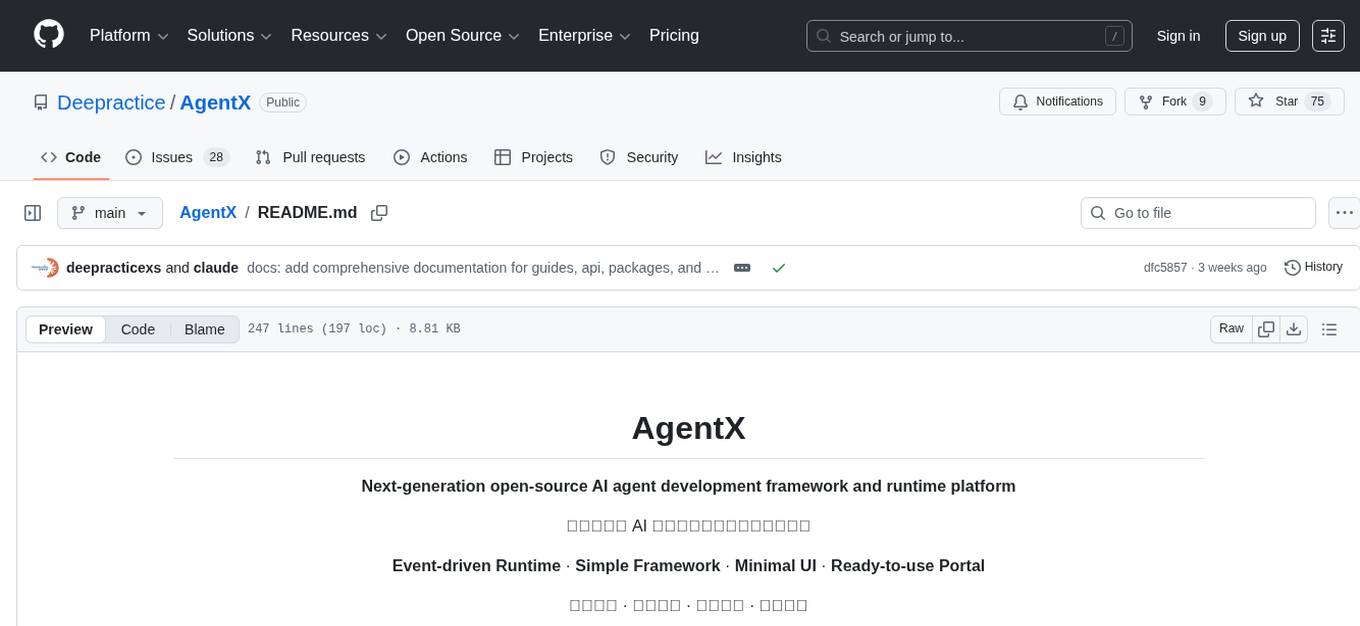
AgentX
AgentX is a next-generation open-source AI agent development framework and runtime platform. It provides an event-driven runtime with a simple framework and minimal UI. The platform is ready-to-use and offers features like multi-user support, session persistence, real-time streaming, and Docker readiness. Users can build AI Agent applications with event-driven architecture using TypeScript for server-side (Node.js) and client-side (Browser/React) development. AgentX also includes comprehensive documentation, core concepts, guides, API references, and various packages for different functionalities. The architecture follows an event-driven design with layered components for server-side and client-side interactions.
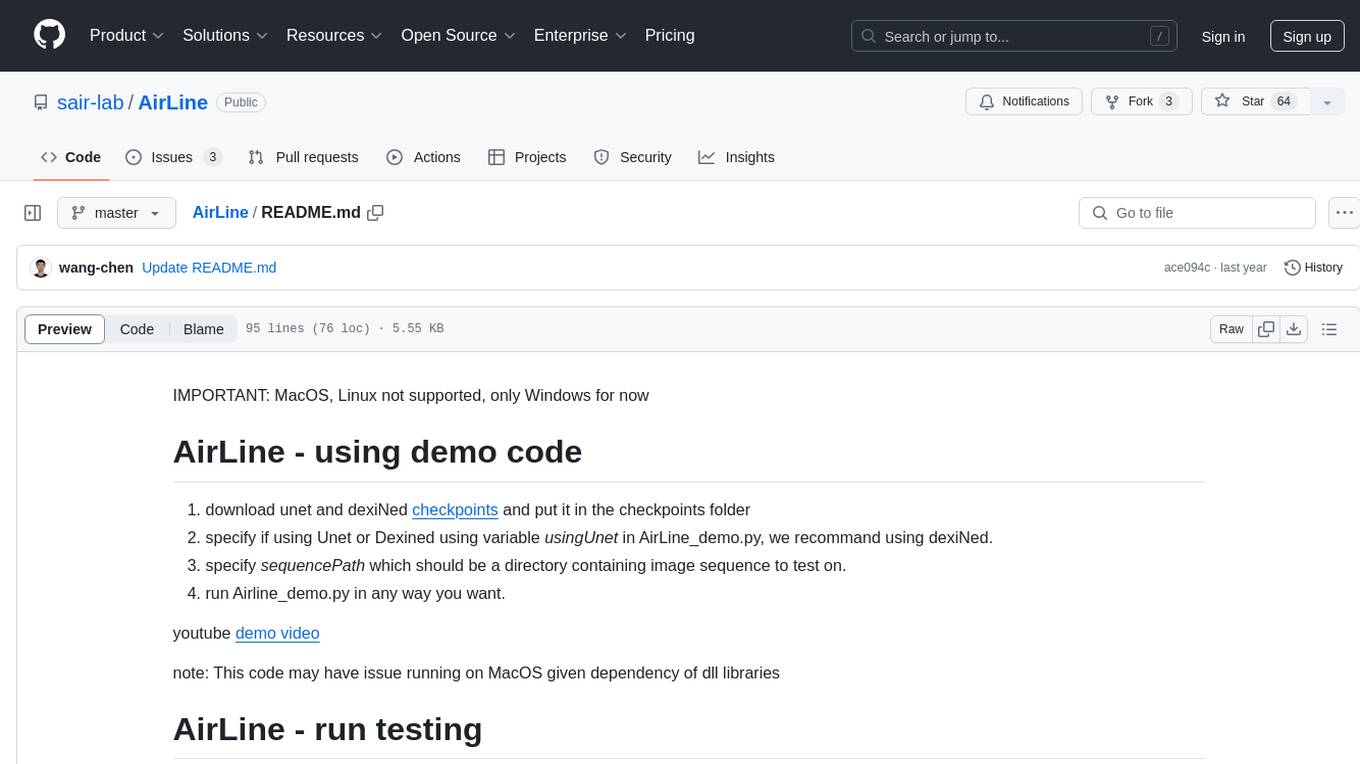
AirLine
AirLine is a learnable edge-based line detection algorithm designed for various robotic tasks such as scene recognition, 3D reconstruction, and SLAM. It offers a novel approach to extracting line segments directly from edges, enhancing generalization ability for unseen environments. The algorithm balances efficiency and accuracy through a region-grow algorithm and local edge voting scheme for line parameterization. AirLine demonstrates state-of-the-art precision with significant runtime acceleration compared to other learning-based methods, making it ideal for low-power robots.
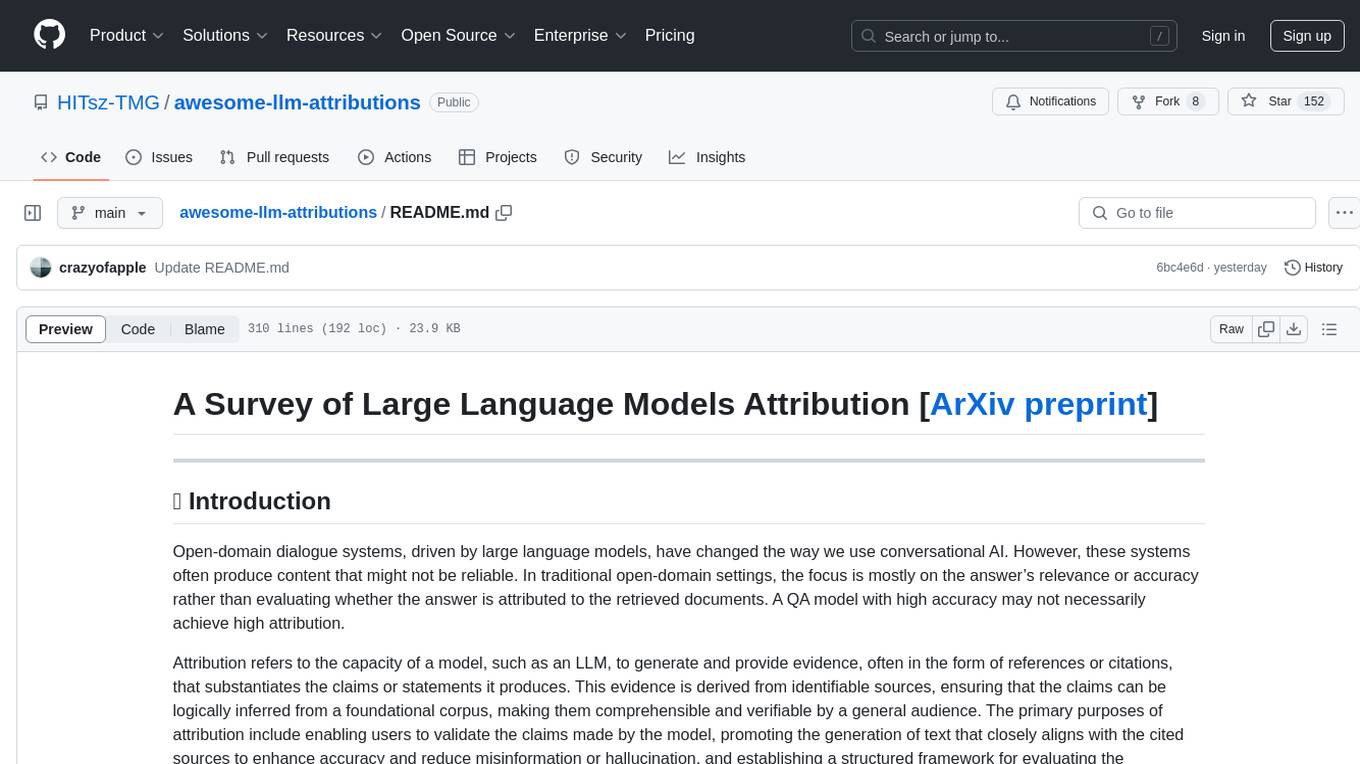
awesome-llm-attributions
This repository focuses on unraveling the sources that large language models tap into for attribution or citation. It delves into the origins of facts, their utilization by the models, the efficacy of attribution methodologies, and challenges tied to ambiguous knowledge reservoirs, biases, and pitfalls of excessive attribution.

activepieces
Activepieces is an open source replacement for Zapier, designed to be extensible through a type-safe pieces framework written in Typescript. It features a user-friendly Workflow Builder with support for Branches, Loops, and Drag and Drop. Activepieces integrates with Google Sheets, OpenAI, Discord, and RSS, along with 80+ other integrations. The list of supported integrations continues to grow rapidly, thanks to valuable contributions from the community. Activepieces is an open ecosystem; all piece source code is available in the repository, and they are versioned and published directly to npmjs.com upon contributions. If you cannot find a specific piece on the pieces roadmap, please submit a request by visiting the following link: Request Piece Alternatively, if you are a developer, you can quickly build your own piece using our TypeScript framework. For guidance, please refer to the following guide: Contributor's Guide
For similar jobs

sweep
Sweep is an AI junior developer that turns bugs and feature requests into code changes. It automatically handles developer experience improvements like adding type hints and improving test coverage.

teams-ai
The Teams AI Library is a software development kit (SDK) that helps developers create bots that can interact with Teams and Microsoft 365 applications. It is built on top of the Bot Framework SDK and simplifies the process of developing bots that interact with Teams' artificial intelligence capabilities. The SDK is available for JavaScript/TypeScript, .NET, and Python.

ai-guide
This guide is dedicated to Large Language Models (LLMs) that you can run on your home computer. It assumes your PC is a lower-end, non-gaming setup.

classifai
Supercharge WordPress Content Workflows and Engagement with Artificial Intelligence. Tap into leading cloud-based services like OpenAI, Microsoft Azure AI, Google Gemini and IBM Watson to augment your WordPress-powered websites. Publish content faster while improving SEO performance and increasing audience engagement. ClassifAI integrates Artificial Intelligence and Machine Learning technologies to lighten your workload and eliminate tedious tasks, giving you more time to create original content that matters.

chatbot-ui
Chatbot UI is an open-source AI chat app that allows users to create and deploy their own AI chatbots. It is easy to use and can be customized to fit any need. Chatbot UI is perfect for businesses, developers, and anyone who wants to create a chatbot.

BricksLLM
BricksLLM is a cloud native AI gateway written in Go. Currently, it provides native support for OpenAI, Anthropic, Azure OpenAI and vLLM. BricksLLM aims to provide enterprise level infrastructure that can power any LLM production use cases. Here are some use cases for BricksLLM: * Set LLM usage limits for users on different pricing tiers * Track LLM usage on a per user and per organization basis * Block or redact requests containing PIIs * Improve LLM reliability with failovers, retries and caching * Distribute API keys with rate limits and cost limits for internal development/production use cases * Distribute API keys with rate limits and cost limits for students

uAgents
uAgents is a Python library developed by Fetch.ai that allows for the creation of autonomous AI agents. These agents can perform various tasks on a schedule or take action on various events. uAgents are easy to create and manage, and they are connected to a fast-growing network of other uAgents. They are also secure, with cryptographically secured messages and wallets.

griptape
Griptape is a modular Python framework for building AI-powered applications that securely connect to your enterprise data and APIs. It offers developers the ability to maintain control and flexibility at every step. Griptape's core components include Structures (Agents, Pipelines, and Workflows), Tasks, Tools, Memory (Conversation Memory, Task Memory, and Meta Memory), Drivers (Prompt and Embedding Drivers, Vector Store Drivers, Image Generation Drivers, Image Query Drivers, SQL Drivers, Web Scraper Drivers, and Conversation Memory Drivers), Engines (Query Engines, Extraction Engines, Summary Engines, Image Generation Engines, and Image Query Engines), and additional components (Rulesets, Loaders, Artifacts, Chunkers, and Tokenizers). Griptape enables developers to create AI-powered applications with ease and efficiency.
























